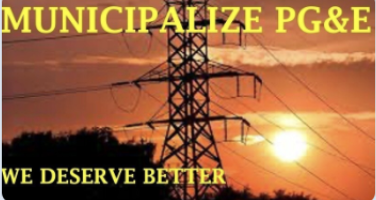Rishi has Challenged PG&E

During my community outreach, I’ve heard the same frustration again and again—PG&E bills are skyrocketing, service delays are unacceptable, and the California Public Utilities Commission (CPUC) continues to rubber-stamp rate hikes with little accountability. PG&E is now the most expensive electric utility in the nation, yet homeowners face long delays for new line installations, reflecting serious mismanagement.
In late 2022, the CPUC slashed the compensation for surplus solar power by 75%, reducing the rate from 25–45 cents to just 3 cents per kilowatt-hour. This drastic cut has crippled consumer interest in rooftop solar, threatening California’s clean energy goals. With these changes, the payback period for installing solar has doubled from 6–8 years to as long as 16—effectively gutting the rooftop solar industry.
PG&E’s aggressive rate hikes, including a proposed income-based fixed charge, unfairly penalize efficient households while rewarding high energy users. This move discourages conservation and places a heavier burden on working families.
We must end this cycle of unchecked utility power. I’m committed to:
- Opposing income-based utility charges
- Restoring strong rooftop solar incentives
- Demanding real oversight of PG&E and CPUC decisions
Californians deserve affordable, reliable, and forward-thinking energy policies—not corporate profits at public expense.
 During my community outreach, I’ve heard the same frustration again and again—PG&E bills are skyrocketing, service delays are unacceptable, and the California Public Utilities Commission (CPUC) continues to rubber-stamp rate hikes with little accountability. PG&E is now the most expensive electric utility in the nation, yet homeowners face long delays for new line installations, reflecting serious mismanagement.
During my community outreach, I’ve heard the same frustration again and again—PG&E bills are skyrocketing, service delays are unacceptable, and the California Public Utilities Commission (CPUC) continues to rubber-stamp rate hikes with little accountability. PG&E is now the most expensive electric utility in the nation, yet homeowners face long delays for new line installations, reflecting serious mismanagement.
In late 2022, the CPUC slashed the compensation for surplus solar power by 75%, reducing the rate from 25–45 cents to just 3 cents per kilowatt-hour. This drastic cut has crippled consumer interest in rooftop solar, threatening California’s clean energy goals. With these changes, the payback period for installing solar has doubled from 6–8 years to as long as 16—effectively gutting the rooftop solar industry.
PG&E’s aggressive rate hikes, including a proposed income-based fixed charge, unfairly penalize efficient households while rewarding high energy users. This move discourages conservation and places a heavier burden on working families.
We must end this cycle of unchecked utility power. I’m committed to:
- Opposing income-based utility charges
- Restoring strong rooftop solar incentives
- Demanding real oversight of PG&E and CPUC decisions
Californians deserve affordable, reliable, and forward-thinking energy policies—not corporate profits at public expense.
It’s time to municipalize PG&E
During our public engagement, countless neighbors reached out to share their frustration over PG&E’s repeated failures during the recent storms. Some households went days without power, with no clear restoration timeline. One resident told me her home has lost electricity 38 times in just the past 13 months.
These storms exposed what many of us already knew: PG&E’s infrastructure is fragile, its management is unaccountable, and its priorities are not with the people. New power hookups take nearly a year. Solar installations are delayed indefinitely because PG&E lacks basic components like transformers. Families invest thousands into clean energy—only to be left in limbo.
We’re dealing with a monopoly that threatens our energy security and economic stability.
It’s time to turn PG&E into a public utility.
Electricity powers our homes, schools, and businesses—it’s too important to be left in the hands of a profit-driven monopoly. Public ownership would ensure decisions are made in the interest of ratepayers, not shareholders.
Still unsure? Just look at the facts:
- Since 2010, PG&E has been found guilty of over 90 felonies, including 84 counts of involuntary manslaughter.
- It has paid more than $25.5 billion in wildfire damages since 2017.
- Despite this, PG&E remains highly profitable—grossing $18 billion in the 12 months ending September 2023.
How?
They filed for bankruptcy on the backs of taxpayers, then raised rates.
The state guarantees PG&E a 10–12% profit on all capital expenditures. So when PG&E spends $6 million to underground a single mile of cable, the cost is passed on to us—and they profit from it. The more they spend, the more they earn. Waste is rewarded.
Meanwhile, they pour millions into TV ads—despite having no competitors. Why advertise? To sell a narrative, not electricity.
And now, the latest insult: income-based billing.
PG&E is shifting to a pricing system where your rates depend on your income, not your usage. Conserve energy? Doesn’t matter. Get a raise at work? Your bill could go up.
This destroys incentives for conservation and penalizes working families.
Enough is enough.
PG&E has:
- Failed to provide reliable service
- Undermined solar adoption
- Endangered communities with reckless mismanagement
- Exploited ratepayers for profit
It’s time for a new path forward—one that prioritizes affordability, safety, clean energy, and public accountability.
We must municipalize PG&E and put our energy future in the hands of the people—not a corporation with a criminal record and a profit motive.
Let’s stand together against corporate greed. Let’s build a truly sustainable, reliable, and affordable energy system—for all Californians.
Help by signing these petitions on Change.org
PG&E wants rates tied to your income
I want to bring your attention to a troubling development—Assembly Bill 205, already signed into law by Governor Newsom, which opens the door to utility rates based on household income. This proposal is now under active review by the California Public Utilities Commission (CPUC)—and PG&E is pushing for it.
Take action now: Sign the petition
https://www.change.org/p/cpuc-stop-this-utility-rates-being-driven-by-income
🔍 What’s at Stake:
Under this proposal, your electricity bill would be determined by how much you earn—not how much you use. That means:
- Your private income data could be handed over to PG&E
- You could pay more each month, regardless of whether you conserve energy
- It would penalize hard-working families and remove incentives for energy efficiency
This approach is deeply flawed. Imagine a world where PG&E charges a flat $200/month, but lowers the per-unit electricity cost—eliminating any economic case for rooftop solar. It’s a clear step backwards for California’s clean energy goals and would further entrench the power of investor-owned utilities.
Why We Must Speak Out:
- It’s unfair and invasive
- It benefits private utilities at the expense of everyday consumers
- It undermines energy conservation and the growing rooftop solar movement
Let’s be clear: CPUC and PG&E must be held accountable. Utility rates should be based on usage—not income.
Sign the petition now and let the CPUC know where you stand:
https://www.change.org/p/cpuc-stop-this-utility-rates-being-driven-by-income
Together, we can protect fairness, privacy, and California’s clean energy future.










